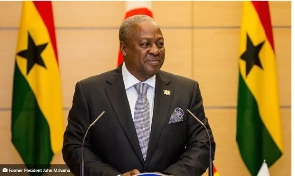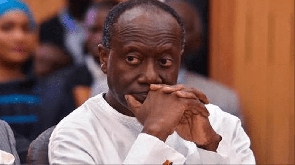Former President John Dramani Mahama at the launch of his campaign for the flagbearership race of the National Democratic Congress (NDC) promised to scrap the retirement benefit given to all Article 71 officeholders, known as ex-gratia when he becomes president, a promise he is reported to have made in 2015.
"The payment of ex-gratia to members of the executive under Article 71 will be scrapped. And the necessary constitutional steps to abolish that payment will start in earnest in 2025.
"We will also begin the process of persuading the order arms of government other than the executive to accept the removal of this ex-gratia payment," he said.
This promise by Mahama has become a matter of public discussion with many Ghanaians questioning whether a president has the power to scrap ex-gratia benefits. This article looks at how ex-gratia benefits are determined and whether they can be scrapped.
Article 71 of Ghana’s constitution states as follows:
The salaries and allowances payable, and the facilities and privileges available, to-
a. The speaker and deputy speakers and members of parliament;
b. The chief justice and the justices of the superior court of Judicature;
c. The Auditor-General, the Chairman and Deputy Chairman Of the Electoral Commission,
d. The Commissioner For Human Rights And Administrative Justice And His Deputies And The District Assemblies Common Fund Administrator;
e. the Chairman, ViceChairmana,n and the other members of,
(i) a National Council for Higher Education, howsoever describes.
ii) the Public Services Commission,
iii) the National Media Commission
iv) the Lands Commission and
v) The National Commission for Civic Education being expenditure charged on the consolidated fund, shall be determined by the President on the recommendations of a committee of not more than five persons appointed by the president acting in accordance with the advice of the council of state.
2. The salaries and allowances payable, and the facilities available, to the President, the Vice President, the chairman and the other members of the Council of State, Ministers of State and Deputy Ministers, being expenditure charged on the consolidated fund, shall be determined by Parliament on the recommendation of the committee referred to in clause (1) of this article.
3. For the purpose of this article and except as otherwise provided, constitution “salaries” includes allowances, facilities and privilege, and retiring benefit or awards.”
Other Article of the 1992 Constitution which speaks about ex-gratia benefits include Article 98 and Article 114.
Article 98(1) reads as follows: A member of Parliament shall be paid such salary and allowances and provided with such facilities as may be determined in accordance with Article 71 of this Constitution.
While Article 114 states that “A person who has served as a member of Parliament for a “period of not less than four years shall be eligible on ceasing to be a member or on his death, for the payment of such gratuity to him or his personal representatives.”
List of Ex-gratia amount Article
The Executive
President- GHC 659,392
Vice President- GHC 549,492
Cabinet Minister-MP- GHC 5,104,352
Cabinet Minister-non MP- GHC 457,928
Minister of State-MP- GHC 427,400
Minister of State-non MP- GHC 421,296
Regional Minister-MP- GHC 427,400
Regional Minister-non MP- GHC 415,188
Deputy Minister-MP- GHC 401,132
Deputy Regional Minister-MP- GHC 401,132
Deputy Minister-non MP- GHC 384,660
Deputy Regional Minister-non MP- GHC 384,660
Chairman, Council of State- GHC 396,872
Member, Council of State- GHC 366,340
The Legislature (Parliament)
Speaker of Parliament- GHC 488,456
1st Deputy speaker- GHC 464,032
2nd Deputy speaker- GHC 457,928
Majority leader- GHC 464,032
Minority leader- GHC 457,928
Deputy Majority leader- GHC 439,612
Deputy Minority leader- GHC 433,504
Majority chief whip- GHC 427,400
Minority chief whip- GHC 421,296
1st Dep Majority chief whip- GHC 415,188
1st Dep Minority chief whip- GHC 407,332
2nd Dep Majority chief whip- GHC 402,976
2nd Dep Minority chief whip- GHC 396,872
Member of Parliament- GHC 390,768
The Judiciary
Chief Justice- GHC 427,612
Supreme Court Judge- GHC 388,872
Court of Appeal Judge+ GHC 352,452
High Court Judge- GHC 278,380
Independent Constitutional Bodies (ICBs)
Auditor-General- GHC 359,608
EC Chair- GHC308,796
EC Deputy Chair- GHC348,164
CHRAJ Commissioner- GHC308,796
CHRAJ Deputy Commissioner- GHC360,900
DACF Administrator- GHC336,584
NCCE Chair- GHC378,224
NCCE Deputy Chair- GHC297,796
NCCE member full-time- GHC348,532
NCCE member part-time- GHC260,956
Lands Commission Chair- GHC365,636
Lands Commission member (part-time)- GHC305,532
Public Services Commission Chair- GHC407,456
Public Services Commission V. Chair- GHC348,740
Public Services Commission member (full time)- GHC334,928
Public Services Commission member (part-time)- GHC271,376
National Medical Commission Chair- GHC334,008
National Medical Commission member- GHC271,376
National Council for Teacher Education Chair- GHC402,776
NCTE members- GHC367,936
So in all the ex-gratia payments that are due Article 71 officeholders will be more than GHC200 million and this amount does not include other facilities provided to these officers including cars, salaries of staff and accommodation facilities.
Also, the list above excludes benefits given to presidential staffers, Municipal, Metropolitan and District Chief Executives (MMDCES) and other appointees.
So, what really can Mahama do?
As the 1992 Constitution stipulates the president determines the salaries and benefits of all Article 71 officeholders except himself and his appointees under the Executive branch of government.
So, the president upon the recommendation of the 5 committees he has set can really review or scrap ex-gratia payment.
Parliament determines the ex-gratia of the president and his appointees (the Executive). So, Mahama and his appointees can reject their retirement benefits even if it is forced on them by Parliament.
You can also watch this episode of People & Places here:
Watch the new episode of The Lowdown below:
IB/OGB
General News of Saturday, 4 March 2023
Source: www.ghanaweb.com













